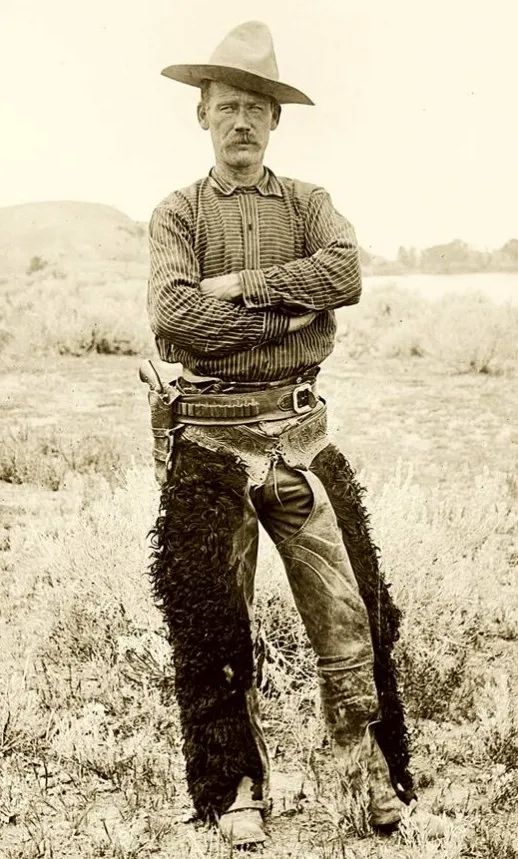
Legacy INDUCTEE
D.J. O'MALLEY "THE N BAR N KID" (1867-1943)
DISTRICT 3 - YEAR 2025
Though he was born in New York City, spent some childhood years in Texas, and lived much of his adult life in Wisconsin, D.J. O’Malley was the quintessential Montana cowboy both in substance and style.
Dominick John (D.J.) O’Malley, also known as Dominick White, the N Bar N Kid, and Kid White, was born in New York City in 1867 to a Civil War veteran father who died from his wounds when D.J. was small. His mother remarried a soldier, Charles White. The family was posted to Fort Keogh in 1877.
While a boy at Fort Keogh, O’Malley met many famous Westerners, including General Nelson Miles — he went to school with the commander’s two children, Sherman and Cecelia — Buffalo Bill Cody, Luther “Yellowstone” Kelly, and Native chieftains Rain-in-the-Face, American Horse, Two Moon, Spotted Elk, and Gall.
At 14, O’Malley left the Fort and crossed the Yellowstone River to work as a horse wrangler for Captain T.H. Logan’s outfit on the Little Dry. Logan soon sold out to the newly formed N Bar N Ranch, and O’Malley found a home with The N Bar N, where he was soon known as the “N Bar N Kid.” He became a regular cowhand for the iconic ranch and helped bring three trail herds to Montana from Texas, the last trip being made in 1891. Eventually, he became the N Bar N’s “rep,” or ranch representative working in roundups with the area’s other large ranches. The N Bar N, owned by the Home Land and Cattle Company, sold out in 1896. O’Malley sensed the days of open range were ending, but he continued to ride for big outfits like the Bow and Arrow, U Diamond, Half Circle L, and the LU Bar. For a period of time, he was the chuckwagon cook for the famous FUF Ranch, which ran 15,000 horses on 1.1 million acres of open range. He also worked as a deputy stock inspector under Billy Smith, a famous stock detective. He served as a deputy sheriff in Rosebud and Custer Counties and worked two stints as a guard in the state prison at Deer Lodge.
His time as a lawman involved one famous incident. Early on Christmas morning in 1885, O’Malley was called to a disturbance at a brothel owned by “Emma the Blond,” where a skirmish between two roller-skating brothers from New York, Frank, and Al Smith, resulted in the accidental killing of Al by Frank. Roller skating was hugely popular at the time, and O’Malley was the area’s five-mile roller skating champion.
In 1909, at the age of 43, O’Malley moved east to Wisconsin, married, and made his home there.
While a sure-enough pioneer cowboy in Montana, O’Malley found more fame with a notebook and pencil than with his saddle and rope. As a young cowboy holding herd, O’Malley found he had a talent for writing verse, and with the encouragement of the other cowboys, he began submitting poems to area newspapers under the pen name of D.J. White. White was the name of the stepfather who had abandoned the family in old Milestown. The first poem that caught the public’s attention was “A Cowboy’s Death,” which told the story of an XIT rep, Charley Rutledge, who, while riding with the N Bar N wagon, died after a fall with his horse.
O’Malley’s “After the Roundup,” also known as “When the Work’s All Done this Fall,” was a poem that became world-famous when it was made into a song. Recorded by a popular “radio cowboy” Doc Sprague, “When the Work’s All Done This Fall” sold 900,000 copies during the 1920s. When other cowboy poets claimed authorship, O’Malley, then raising raspberries in Wisconsin, was able to prove his claim as the writer. While he got his poetic dues, O’Malley never received a dime in royalties. The song is still popular at Western funerals today.
Writing later as N Bar N Kid White, O’Malley published scores of poems, essays, and prose. As someone who had actually lived the life of a cowboy on the Western range, he became a valuable historian and wasn’t shy about correcting other cowboy poets when they got their facts wrong.
At the first annual meeting of the Range Riders in Miles City in 1939, O’Malley — a Range Riders member — came from Wisconsin to be the honored guest. He did this again at the meetings in 1940 and 1941.
D.J. O’Malley passed away in 1943, and though he’d lived most of his life in Wisconsin, there was no doubt as to where his heart was. His last wishes insisted he be buried at Miles City.
Photo by L. A. Huffman

